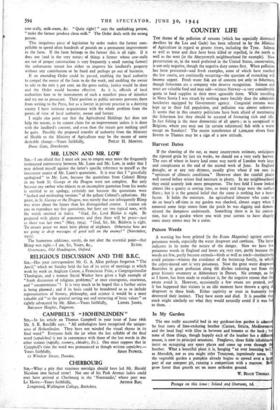COUNTRY LIFE
THE theme of the pollution of streams (which has especially distressed dwellers by the Lea and Gade) has been referred to by the Minister of Agriculture in regard to greater rivers, including the Tyne. Salmon as well as trout and dace have been killed or repelled, in the north as well as the west (in the Aberystwyth neighbourhood for example). Now preservation or, in the word preferred in the United States, conservation, is not only negative, though the negative duty comes first. When pollution has been prevented—and fresh examples, some of which have reached the law courts, are continually occurring—the question of restocking will become urgent. Fresh water fish are of concern not only to fishermen, though fishermen are a company who deserve recognition. Salmon and trout are valuable food and may add—witness Norway—a very considerable quota to food supplies in their most agreeable form. While travelling in Nova Scotia I was struck by nothing more forcibly than the admirable hatcheries equipped by Government agency. Congenial streams were kept up to their full population, and pollution was almost unknown. It seems that in this country politicians have been afraid of mentioning the fishermen lest they should be accused of favouring rich and idle. In fact fishing is the most democratic of all sports ; as is recognised in Belgium, where you may not (in certain references) fish with a worm except on Sundays! The recent transference of t,000,000 elvers from Severn to Thames may be a sign of a new attitude.
Harvest Dates If the shooting of the ear, as many countrymen estimate, anticipates the ripened grain by just six weeks, we should see a very early harvest. The ears of wheat in heavy land some way north of London were large and conspicuous at the end of the second week of June. In England drought, or at any rate dryness, usually gives wheat if not oats its " optimum of .climatic conditions." However short the rainfall plants well rooted before winter find moisture in plenty. In my neighbourhood they could scarcely look more prosperous. The best field I know looked almost like a quarry at sowing time, so many and large were the surface flints ; but it is the general belief that the stone is nothing but a bene- factor. It holds the moisture. An agricultural labourer who came to do an hour's off-time in my garden was shocked, almost angry when I removed some large stones from the patch he was digging and demon- strated the dampness underneath. Something there is in his conten- tion, but in a garden where you wish your carrots to have shapely roots many stones may be a curse.
Poison Weeds A warning has been printed (in the Estate Magazine) against certain poisonous weeds, especially the water dropwort and cowbane. The latter indicates in its name the nature of the danger. Now we have few poisonous weeds in England and losses are, very rare, partly because the weeds are few, partly because animals—birds as well as stock—instinctively avoid poisons witness the avoidance of the buttercup family, in which the celery-leaved sort is very poisonous. Now the great water dropwort flourishes in great profusion along the ditches radiating out from the great historic swannery at Abbotsbury in Dorset. No attempt, so for as I know, has been made to eradicate it, for the negative reason that the swans avoid it. However, occasionally a few swans are penned, and it has happened that visitors in an idle moment have thrown a sprig of dropwort to these birds. Either captivity or trust in humanity has destroyed their instinct. They have eaten and died. It is possible that stock might similarly eat what they would naturally avoid if it was fed to them. .
In My Garden The one really successful bed in my gardener-less garden is adorned by four roots of lime-enduring heather (Carnea, Stricta, Mediterranes, and the local ling) with lilies in between and brooms at the back ; but none of these things, though happily each of the heather has a different season, is now its principal ornament. Foxgloves, those fickle inhabitant', insist on occupying any spare places and come, up even through the heather. What a beautiful plant it is, hanging "an ever lessening bell,' as Meredith, not as you might infer Tennyson, ingeniously notes. III the vegetable garden a pumpkin already begins to spread over a largc part of our compost pit, running a competition with a marrow. Sod grow faster than gourds set on more orthodox ground.
W. BEACH THOMAS.
Postage on this issue : Inland and Overseas, Id.






























 Previous page
Previous page